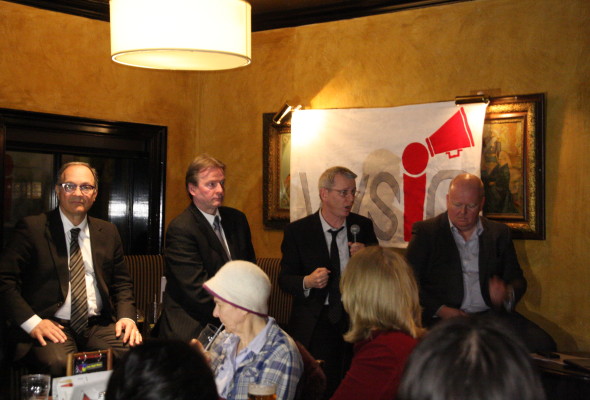There was a large and lively crowd on Monday to hear a strong discussion about the Toronto Casino proposal.
Rosario Marchese, MPP of Trinity-Spadina (a downtown riding often proposed as a location for the casino), started the evening off with some arguments against a putting a casino so close to residential neighbourhoods. Residents of Liberty Village are worried that a casino at the Ex would “suck the life out” of the area. While Casinos themselves are often vibrant, businesses around them do not remain so. Over the last year, $700M was lost by the government in gaming so this will be a net tax on citizens. Rosario doesn’t believe the casino will add value to the neighbourhood he represents.
Mike Yorke, president of the Carpenter’s Union, argued that the jobs created by the casino are well worth it. The project will cost $2-3B to build and since it’s a private sector project, taxpayers are not on the hook. Yorke estimates 6000 construction jobs will come from the casino. This is about 4-5 times the number of jobs from the Bridgepoint hospital project. Toronto is now the 4th largest city in North America but barely comes in the top 30 for conventions. If we had a better convention complex, hundreds of lanyard wearing people would be frequenting local restaurants and businesses during trade shows and conventions.
Adam Vaughan, councillor of Ward 20 adjacent to the proposed casino site is also against the idea. Vaughan argues that every slot machine requires 13.6 car movements per day to turn a profit. The 5000 slot machines at the proposed casino would therefore require 11,000 parking spots. MGM is currently calling for 12,000 parking spots. Vaughan argues that because of the difficulties of waterfront construction, each parking spot would cost $50,000. The first $1B of this project will be sunk into building adequate parking to feed the complex. Toronto doesn’t need 7.5 football fields worth of slots and card tables. Vaughan’s suspicions of the numbers put forth by casino proponents were raised by 2 facts. 1) $2-$4 billion is a very big swing for a company that claims to have done a detailed business case. 2) MGM lost $1.8 billion last year. If they can’t manage their existing business, how well would they manage new investments? No casino should be contemplated without a third party doing due diligence.
Paul Burns, vice president of the Canadian Gaming Association, tried to deconstruct Vaughan’s arguments. In reality, the casino itself would take up only 10% of the complex’s floor space. The other 90% will be used for restaurants, convention space, and other amenities. The average industry job pays $50,000 per year. MGM averages $60,000 per year for their workers and many are unionized positions. Oxford is proposing 4000 parking spots because it recognizes that gaming isn’t a 9-5 industry that competes with commuters but it’s a 24 hour industry that attracts patrons around the clock. Gaming could make Toronto a destination much like Vegas. Moreover, a gaming facility in Toronto could help retain money in the local economy as well as attract tourism. Currently, 275,000 passengers leave Toronto for Las Vegas every year. Creating an iconic resort could keep a lot of dollars flowing locally.
Questions from the floor generated much heated debate. At one point, the wisdom of investing in a casino was challenged when Ontario has so many poverty issues to deal with. Mike Yorke pointed out that this isn’t an either or situation. Because the casino is funded with private, not public dollars, it would have no impact on the government’s ability to invest in impoverished communities.
Vaughan pointed out that casino workers are routinely fired before the 4 year mark when they would be eligible for certain pension benefits. The fact that 30% of workers will be part time is also concerning since they receive the lowest pay and the least benefits. Burns pointed out that many people choose to work part time for flexibility and people who choose only part time work should not be denigrated.
Given the parking requirements, one audience member pointed out that a place like Square One in Mississauga would be logical (since it’s already a very large parking lot). Why is that not considered? Vaughan quickly pointed out that most GTA municipalities had already said ‘no’ to the casino.
Another audience member challenged Burns on the name of his organization. Why is it called the “gaming” association when it is in fact a “gambling” association? Taking heat, Burns defended the name. They have never hidden what they represent.
Vaughan reiterated why the industry projections can’t be trusted. Assumptions are made that are often not true. Melbourne had banked on attracting Asian tourists to their casino. That dream never came to fruition because shortly after Melbourne’s casino was built, Macau quickly built itself up as the Las Vegas of Asia. There are only so many gambling dollars to be shared. It’s a simple equation of supply and demand. Demand projections were based on statistics when supply was low. Supply of gambling is now plentiful and those assumptions should be validated.
Note: None of the facts provided by the speakers have been verified.
Rosario Marchese’s Opening Remarks
Mike Yorke’s Opening Remarks
Adam Vaughan’s Opening Remarks
Paul Burn’s Opening Remarks







